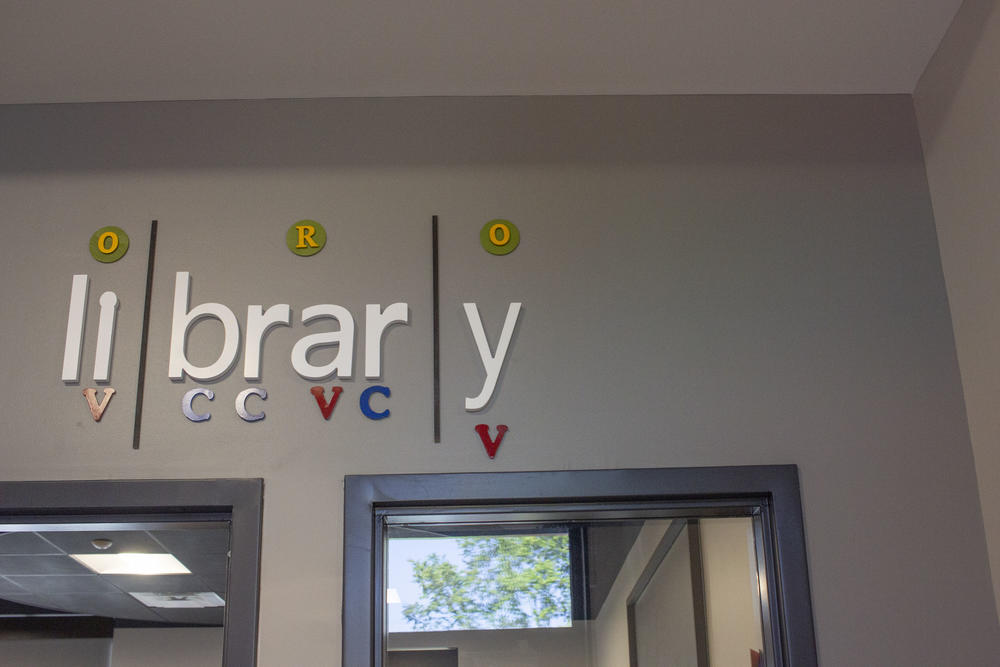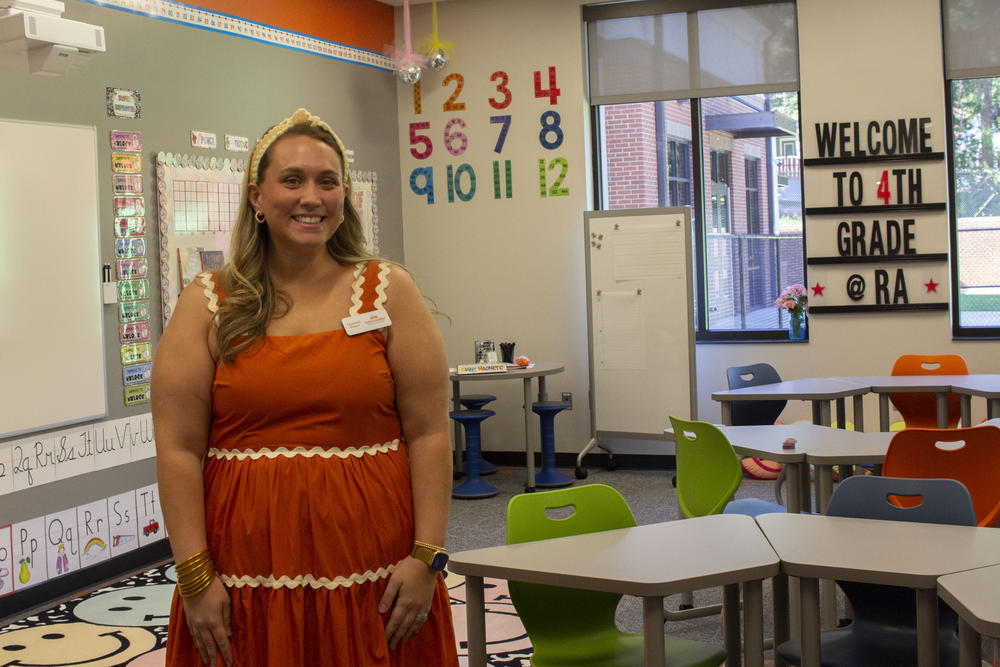
Caption
A sign for the library at the Roberts Academy at Mercer University in Macon, Ga., exemplifies a method of sounding out words that makes it easier for dyslexic students to read.
Credit: Sofi Gratas/GPB News
|Updated: August 14, 2024 5:49 PM
LISTEN: Starting with just 30 dyslexic students in second through fifth grades, the Roberts Academy at Mercer University hopes to more than double enrollment over the next few years. It’s the first of its kind outside of metro Atlanta. GPB's Sofi Gratas reports.

A sign for the library at the Roberts Academy at Mercer University in Macon, Ga., exemplifies a method of sounding out words that makes it easier for dyslexic students to read.
A new private elementary school in Macon aims to bridge the learning gap many dyslexic students, even those with special education plans, experience in the classroom.
Starting with just 30 dyslexic students, grades second through fifth, the Roberts Academy at Mercer University hopes to more than double enrollment over the next few years. It’s the first of its kind outside of metro Atlanta.
Decorations lining the hallways of the new school building in Macon’s intown neighborhood hail dyslexia as a “superpower” and point out facts and myths about the learning disability. A kid-height mirror above a water fountain boasts the “Dyslexia hall of fame.”
These touches are intentional, to help create a safe space for students.
“The positivity in all of this, it makes a huge difference,” said Joy Wood, head of the school.
Wood previously ran another specialized learning school in suburban Atlanta. Looking to set itself apart, the Roberts Academy boasts a much lower tuition than its competition at around $10,000 a year.
So far, Wood said students from 11 counties in and around Middle Georgia are enrolled to start classes this week, many who have received scholarships through the Georgia Department of Education for special needs education.
Student support specialist and reading teacher, Caroline Grove, said having a safe space for learners with dyslexia is crucial to helping them prepare for an eventual return to traditional education.
“I've taught in a dyslexic school before, and students just come in with so much broken self-confidence,” said student support specialist and reading teacher, Caroline Grove.
All the students coming here will be from different schools, where Grove said they may have been exposed to specialized learning by aids or tutors.
But at the Roberts Academy, dyslexic students are the focus. Even the signage to the library and cafeteria, among other rooms, are written in a special way that uses symbols to emphasize consonants, vowels and pronunciation.
“This is how we'll teach the kids in the classroom,” Grove said.
In its basic form, dyslexia makes it difficult for the brain to attach sounds to words.
All of the teachers at the Roberts Academy are trained in a special method that breaks down reading and writing, called the Orton Gillingham approach. It relies on using multiple senses, like tapping syllables or touching words, as well as repetition.
This approach works “to build the neural pathway that doesn't exist for students with dyslexia,” Grove said.
There will be about 12 students per class with even smaller, daily reading classes. Students will get the attention they aren’t always guaranteed at traditional schools, said fourth grade teacher Elizabeth Eidson.

Fourth grade teacher Elizabeth Eidson stands in her classroom at the Roberts Academy in Macon on August 13, 2024.
“Dyslexia has such a negative connotation because people just don't know what it is,” Eidon said. “And so coming here, they are nervous that ‘I'm going to be taught how to read. And I don't know how to read.’”
Standing in her colorful classroom soon to be filled with fourth graders, Eidson shares that as a former special education teacher, she had several students show signs of dyslexia or other learning disabilities, but who never received an official diagnosis.
That limits their ability to receive extra support at school, or even from specialists for behavioral issues they may be experiencing as a result.
“They're used to school being a certain way,” Eidson said. “A lot of our students have never been pushed to really excel in school. They kind of have that learned helplessness.”
Eidson said she and other teachers plan to flip that learned helplessness into empowerment, and become a resource center for families who want more information on dyslexia.
All of the students attending the Roberts Academy have either an Individualized Education Program or 504 plan from their previous school, a sort of waiver that is supposed to guarantee accommodations for a learning or developmental disability. Those plans will remain active while they're at the transitional Roberts Academy, staff said.
Georgia schools aren’t allowed to diagnose dyslexia, only psychologists can. But a push from lawmakers in 2019 to make mandatory dyslexia screenings for kindergarten through third grade resulted in legislation that goes into effect this school year, after a yearslong pilot program across several counties. The mandate will make it easier for school systems to identify kids with characteristics of dyslexia and refer them to additional support.